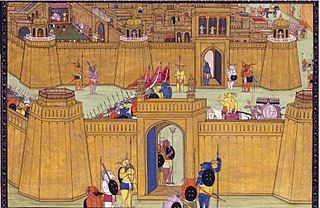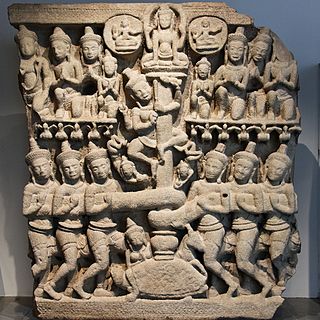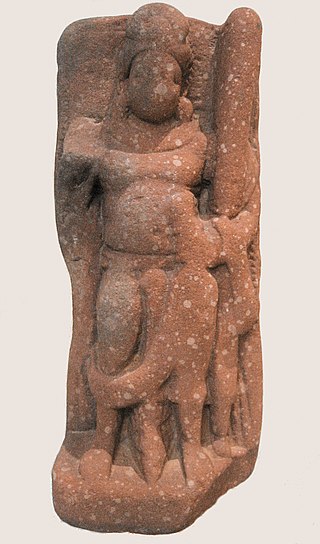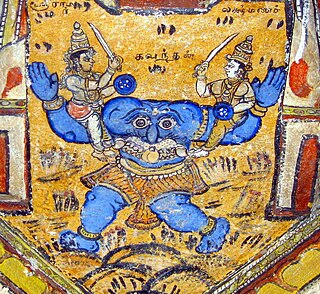Related Research Articles

Ravana is a mythological demon-king of the island of Lanka and the chief antagonist in the Hindu epic Ramayana. In the Ramayana, Ravana is described as the eldest son of sage Vishrava and Kaikasi. He abducted Lord Rama's wife, Sita, and took her to his kingdom of Lanka, where he held her in the Ashoka Vatika. Lord Rama, with the support of vanara King Sugriva and his army of vanaras, launched a rescue operation for Sita against Ravana in Lanka. Ravana was subsequently slain, and Rama rescued his beloved wife Sita.

Rākshasa are a race of usually malevolent beings prominently featured in Hinduism, Buddhism, Jainism and Folk Islam. They reside on Earth but possess supernatural powers, which they usually use for evil acts such as disrupting Vedic sacrifices or eating humans.

Kubera also known as Kuvera, Kuber and Kuberan, is the god of wealth, and the god-king of the semi-divine yakshas in Hinduism. He is regarded as the regent of the north (Dikpala), and a protector of the world (Lokapala). His many epithets extol him as the overlord of numerous semi-divine species, and the owner of the treasures of the world. Kubera is often depicted with a plump body, adorned with jewels, and carrying a money-pot and a club.

Lanka is the name given in Hindu epics to the island fortress capital of the legendary asura king Ravana in the epics of the Ramayana and the Mahabharata. The fortress was situated on a plateau between three mountain peaks known as the Trikuta Mountains. The ancient city of Lankapura is said to have been burnt down by Hanuman. After its king, Ravana was killed by Rama with the help of Ravana's brother Vibhishana, the latter was crowned king of Lankapura. His descendants were said to still rule the kingdom during the period of the Pandavas. According to the Mahabharata, the Pandava Sahadeva visited this kingdom during his southern military campaign for the rajasuya of Yudhishthira. The palaces of Ravana were said to be guarded by four-tusked elephants.

In the Hindu epic Ramayana, Maricha, or Mareecha is a rakshasha, who was killed by Rama, the hero of the epic and an avatar of Vishnu. He is mentioned as an ally of Ravana, the antagonist of the epic. His most notable exploit is his role in the kidnapping of Sita, Rama's wife. His son Kalanemi was killed by Hanuman.

Hindu mythological wars are the wars described in the Hindu texts of ancient India. These wars depicted both mortals of great prowess as well as deities and supernatural beings, often wielding supernatural weapons of great power. Hindu teachings prescribe war as the final option, to be employed only after all peaceful methods are exhausted. Participation in righteous war, or dharmayuddha, was said to be honourable and was a principal duty of the Kshatriya or the warrior varna, and victory in such wars was regarded as a matter of honour.

Shurpanakha, is a rakshasi (demoness) in Hindu epic. Her legends are mainly narrated in the epic Ramayana and its other versions. She was the sister of Lanka's king, Ravana, and the daughter of the sage Vishrava and the rakshasi Kaikeshi. Shurpanakha's role in the original epic is small, yet significant.

Vaṅga was an ancient kingdom and geopolitical division within the Ganges delta in the Indian subcontinent. The kingdom is one of the namesakes of the Bengal region. It was located in southern Bengal. Vanga features prominently in the epics and tales of ancient India as well as in the history of Sri Lanka.
Danda is a region frequently mentioned in Hindu mythology, and is prominently featured in various narratives, such as Dandaka, which refers to both a kingdom and forest of the same name. Danda was a colonial state of Lanka during the reign of Ravana, with his governor Khara ruling the province. The region served as a stronghold for all the Rakshasa tribes living in the Dandaka Forest
The Saraswata kingdom was an ancient kingdom, territory, or region on the banks of the Sarasvati River during the pre-historic ages. This region is mentioned in detail in as many as 20 chapters in the Mahabharata from (9:35) to (9:54). Balarama traced the Saraswati river through its partially dried up course from the ocean near Prabhasa to its origin in the Himalayas.
Nishada is a tribe mentioned in ancient Indian literature. The ancient texts mention several kingdoms ruled by this tribe. In the Mahabharata, the Nishadas are described as hunters, fishermen, mountaineers or raiders that have the hills and the forests as their abode. Their origin is associated with a king called Vena who became a slave to wrath and malice, and became unrighteous. Sages killed him for his malice and wrongdoings. Ekalavya is stated to be an archer of a Nishada tribe in the text.
Kimpurusha kingdom refers to the territory of a tribe called Kimpurushas who were one among the exotic tribes of ancient India. These exotic tribes lived in inaccessible regions like the Himalaya mountains.

The Yaksha kingdom refers to the mythological kingdom of the yakshas, a race featured in Hinduism. Kubera is referred to as the king of the Yakshas.
Dandakaranya, also rendered Dandaka, is a historical region and the name of a forest mentioned in the ancient Indian epic Ramayana. It covers about 92,200 square kilometres (35,600 sq mi) of land, which includes the Abujhmar Hills in the west and the Eastern Ghats in the east, including regions of Andhra Pradesh, Maharashtra, Chhattisgarh, Odisha and Telangana states. It spans about 300 kilometres (200 mi) from north to south and about 500 kilometres (300 mi) from east to west.

In Hinduism, Kabandha is a Rakshasa (demon) who is killed and freed from a curse by the god Rama – an Avatar of Vishnu – and his brother Lakshmana. Kabandha's legend appears in the Hindu epics Ramayana and Mahabharata, as well as in later Ramayana adaptations.
References
- Mahabharata of Krishna Dwaipayana Vyasa, translated to English by Kisari Mohan Ganguli